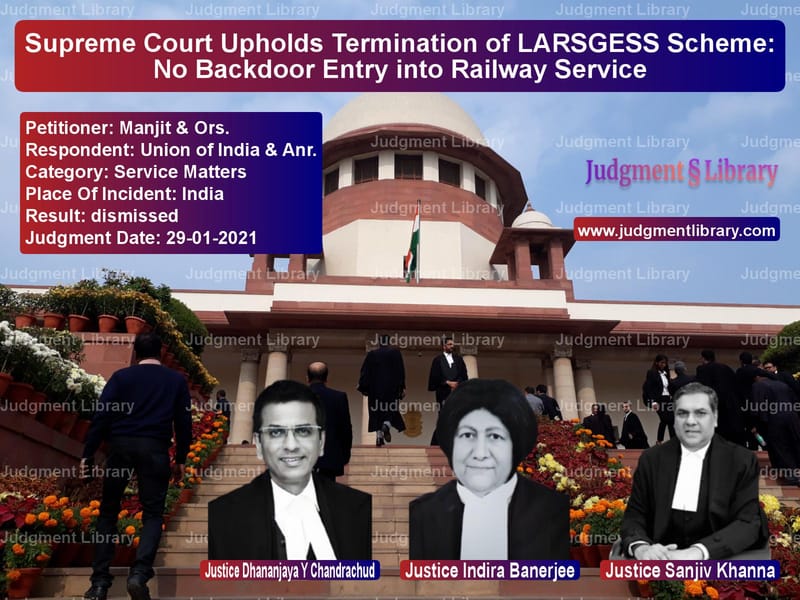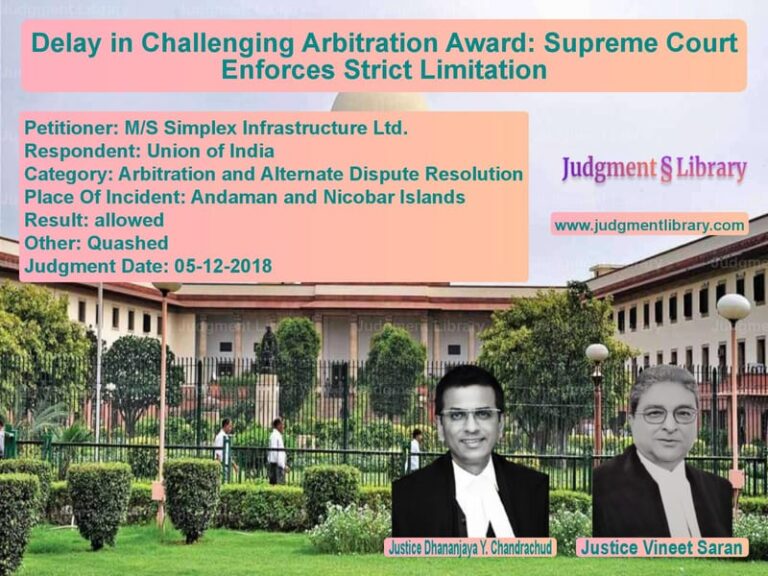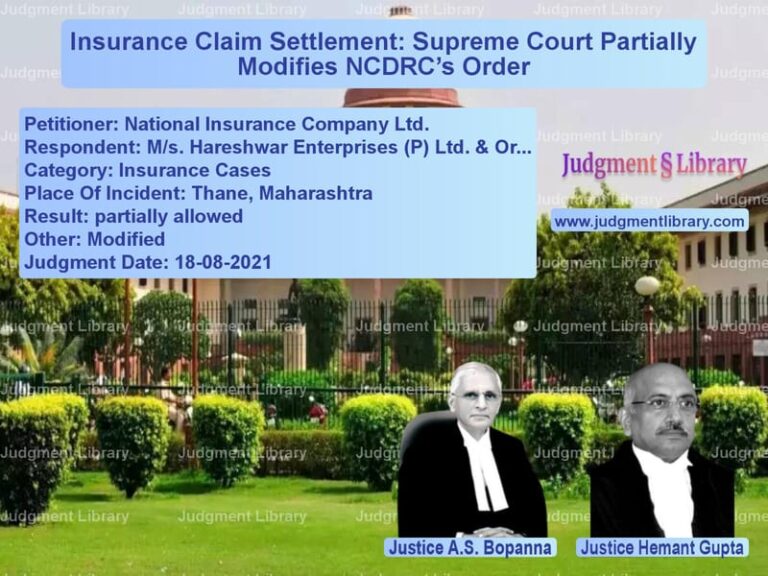Supreme Court Upholds Termination of LARSGESS Scheme: No Backdoor Entry into Railway Service
The Supreme Court of India, in the case of Manjit & Ors. vs. Union of India & Anr., dismissed a writ petition filed under Article 32 of the Constitution. The petitioners sought a mandamus directing their appointment under the now-terminated LARSGESS (Liberalised Active Retirement Scheme for Guaranteed Employment for Safety Staff) scheme of the Indian Railways. The Court upheld the decision of the Union of India to discontinue the scheme, ruling that it was fundamentally inconsistent with the principles of fair employment enshrined in the Constitution.
Background of the Case
The LARSGESS scheme was introduced by the Indian Railways to provide employment opportunities to the wards of railway employees in safety categories. The scheme allowed employees to take voluntary retirement after attaining a certain age, with a guarantee that their ward would be appointed in their place.
However, concerns regarding the legality and fairness of the scheme led to its judicial scrutiny. The Punjab and Haryana High Court, in its orders dated 27 April 2016 and 14 July 2017, directed the Union of India to reconsider the scheme. The Supreme Court, in an order dated 8 January 2018, instructed the government to take a conscious decision regarding the scheme within six weeks.
On 5 March 2019, the Ministry of Railways decided to terminate the LARSGESS scheme, stating:
“Accordingly, it has been decided to terminate the LARSGESS Scheme w.e.f. 27.10.2017 i.e., the date from which it was put on hold. Therefore, no further appointments should be made under the Scheme.”
Following this decision, the Supreme Court, in its order dated 6 March 2019, noted that since the scheme had been terminated, no further action was necessary.
Petitioners’ Arguments
- The petitioners argued that they had a legitimate expectation of appointment under the LARSGESS scheme.
- They contended that their wards had completed all formalities, including medical examinations, prior to the termination of the scheme.
- The Union of India had previously assured the Court that instructions regarding pending cases would be issued, but no such instructions were provided.
- The sudden termination of the scheme violated their right to equality and fair treatment under Articles 14 and 16 of the Constitution.
Respondents’ Arguments
- The Union of India maintained that the scheme was legally flawed as it allowed a “backdoor entry” into railway service without undergoing a competitive selection process.
- It was contended that the scheme was inconsistent with Article 16, which mandates equal opportunity in public employment.
- The government had consulted legal experts and found the scheme to be unconstitutional, justifying its termination.
- The government also highlighted that no vested right to employment existed under the scheme.
Supreme Court’s Observations
The Supreme Court, in its judgment authored by Dr. Dhananjaya Y Chandrachud, upheld the termination of the LARSGESS scheme, stating:
“The Scheme provided for an avenue of a back door entry into the service of the railways. This would be fundamentally at odds with Article 16 of the Constitution. The Union government has with justification discontinued the scheme.”
The Court also held that the petitioners could not claim a vested right or legitimate expectation under an unconstitutional scheme:
“All claims based on the Scheme must now be closed.”
Further, the Court emphasized that allowing the petitioners’ requests would violate previous Supreme Court rulings that upheld the principles of fair selection in public employment.
Final Judgment
The Supreme Court dismissed the writ petition, ruling that the Union of India had lawfully terminated the LARSGESS scheme and that no further appointments should be made under it. A certified copy of the judgment was directed to be forwarded to the Chairman of the Railway Board for compliance.
Conclusion
This judgment reaffirms the constitutional mandate of equal opportunity in public employment. The Supreme Court’s decision ensures that recruitment in government services remains merit-based and free from preferential treatment, thereby upholding the principles of justice and fairness.
Petitioner Name: Manjit & Ors..Respondent Name: Union of India & Anr..Judgment By: Justice Dhananjaya Y Chandrachud, Justice Indira Banerjee, Justice Sanjiv Khanna.Place Of Incident: India.Judgment Date: 29-01-2021.
Don’t miss out on the full details! Download the complete judgment in PDF format below and gain valuable insights instantly!
Download Judgment: manjit-&-ors.-vs-union-of-india-&-anr-supreme-court-of-india-judgment-dated-29-01-2021.pdf
Directly Download Judgment: Directly download this Judgment
See all petitions in Employment Disputes
See all petitions in Recruitment Policies
See all petitions in Public Sector Employees
See all petitions in Judgment by Dhananjaya Y Chandrachud
See all petitions in Judgment by Indira Banerjee
See all petitions in Judgment by Sanjiv Khanna
See all petitions in dismissed
See all petitions in supreme court of India judgments January 2021
See all petitions in 2021 judgments
See all posts in Service Matters Category
See all allowed petitions in Service Matters Category
See all Dismissed petitions in Service Matters Category
See all partially allowed petitions in Service Matters Category







